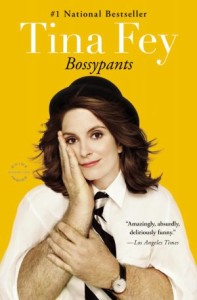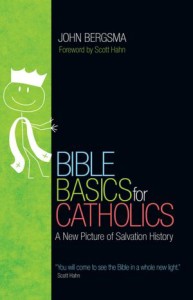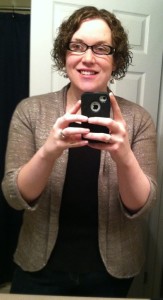It dawned on me near the end of 2011 that in the twelve previous months, I had read only four books.
Mildly disgusted by how much time I clearly had wasted watching reruns of
Everybody Loves Raymond instead of reading (true story), and constantly taunted by my giant stack of yet to be read books, I set out to read more than four books in 2012. Via the blog, I publicly declared the year
ARLEEN’S YEAR OF SO MUCH MORE READING THAN IN YEARS PAST! (“Books in 2012,” for short.)
There’s a zero percent chance I’ll read another book before the year ends (busy, busy!), but before the new year starts, I’d like to recap what I read in 2012.
The grand total?
Twenty books.
Below, you’ll find them in the order in which I read them, an excerpt and/or a reaction and a rating, one star being the worst and five stars being the best. Click the title to read the full post I wrote about it after I read it.:
1. Why do we Believe? by Fr. Benedict J. Groeschel, CFR- 3 Stars
“Many people get involved in that useless old argument over faith and works. I never met good Protestants who didn’t think they should obey God’s will, and I never met good Catholics who thought they would get to heaven just by doing good works, such as giving away turkeys at Thanksgiving.”
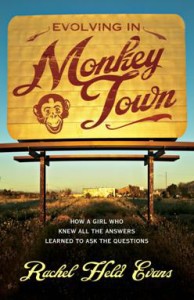 2. Evolving in Monkey Town by Rachel Held Evans – 4 Stars
2. Evolving in Monkey Town by Rachel Held Evans – 4 Stars
“… I’m also convinced that our interpretations of the Bible are far from inerrant. The Bible doesn’t exist in a vacuum but must always be interpreted by a predisposed reader. Our interpretations are colored by our culture, our community, our presuppositions, our experience, our language, our education, our emotions, our intellect, our desires, and our biases. My worldview affects how I read the Bible as much as the Bible affects my worldview.”
3. I’ll Quit Tomorrow by Vernon E. Johnson – 3 Stars
“It is essential to know one’s own feelings at a given moment, but in a life in relationship it is necessary to sense with equal accuracy the feelings of the other person. More particularly, it is important to recognize how one’s own behavior influences someone else’s emotional response. … It is obvious, of course, that without personal insight empathy is impossible. One must be in touch with one’s own feelings in order to have any real appreciation or understanding of another’s.”
4. Rome Sweet Home by Scott and Kimberly Hahn – 4 Stars
“We gradually became convinced that Martin Luther let his theological convictions contradict the very Scripture that he supposedly chose to obey rather than the Catholic Church. He declared that a person is not justified by faith working in love, but rather he is justified by faith alone. He even went so far as to add the word ‘alone’ after the word ‘justified’ in his German translation of Romans 3:28 and called Saint James ‘an epistle of straw’ because James 2:24 specifically states ‘…for we are not justified by faith alone.'”
5. Practicing the Way of Jesus by Mark Scandrette – 3.5 Stars
“The crisis of evangelism in the Western world is not a lack of information about the gospel, but a scarcity of examples of transformed people who would provoke others to ask, ‘How did you discover this remarkable new way of life?'”
6. How Do You Kill 11 Million People? by Andy Andrews – 1.5 Stars
“But in terms of why we do what we do, how we govern each other, what our society allows and why—very few of us intentionally connect the truth of the past with the realities of where we have ended up today.”
7. Bossypants by Tina Fey – 4 Stars
“When I was a kid, there was a TV interstitial during Saturday morning cartoons with a song that went like this: ‘The most important person in the whole wide world is you, and you hardly even know you. / You’re the most important person!’ Is this not the absolute worst thing you could instill in a child? They’re the most important person? In the world? That’s what they already think. You need to teach them the opposite. They need to be a little afraid of what will happen if they lose the top of their Grizzly Adams thermos.”
8. A Million Little Pieces by James Frey – 2 Stars
This was required reading for a substance abuse class. While I didn’t dislike all of it, there wasn’t much to report other than a) Frey dropped too many F-bombs for my taste, b) it does depict what the mind might be like of a person who is dependent on drugs or alcohol and c) the part in which Frey’s friend and fellow treatment center resident Matty uses words like “grasshole” when he’s mad, because he’s trying to stop swearing, is hilarious.
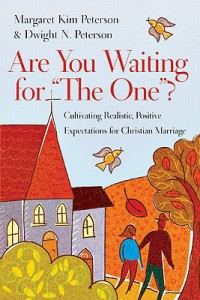 9. Are You Waiting for the One? by Margaret and Dwight Peterson – 4.5 Stars
9. Are You Waiting for the One? by Margaret and Dwight Peterson – 4.5 Stars
“One of the first things to be said about sex is that it is okay not to know everything. Our culture glorifies sexual prowess—many people simply assume that sexual experience and personal maturity go together, and that anyone who is virginal or otherwise inexperienced is for that reason a mere child. … In reality, experience and maturity are not the same thing. It is possible to have a great deal of sexual experience and to be a thoroughly immature person, and possible likewise to have little or no experience of sexual relationship and yet to be secure and well grounded in one’s own masculinity or femininity.”
10. The Dance of Fear by Harriet Lerner – 4 Stars
“We can’t stop bad things from happening, but we can stop our relentless focus on how things were or how we want them to be, and develop a deeper appreciation for what we have now.”
11. unPlanned by Abby Johnson – 4 Stars
“I’m thinking of people like Elizabeth, Marilisa, some friends from church and even college days—people who befriended me and stood by me for years even though they did not agree with what I did at Planned Parenthood, even though they do not believe in abortion. Those people modeled for me something far deeper, far stronger than situational friendship: they loved and accepted me even when I was (or am) doing something they found morally objectionable. They didn’t just talk about love—they put flesh on that concept.”
12. In a Pit With a Lion on a Snowy Day by Mark Batterson – 3.5 Stars
“At the end of the day, success equals stewardship and stewardship equals success. But our view of stewardship is far too parochial. Sure, how we manage our time, talent and treasure is a huge stewardship issue. But what about being a good steward of our imagination? Or our medial ventral prefrontal cortex (the seat of humor, according to neurologists)? Or how about stewardship of our sex drive and competitive streaks? Stewardship is all-inclusive. We’ve got to be good stewards of every second of time and every ounce of energy.”
13. Quitter by Jon Acuff – 4 Stars
“When I finally published a book, I couldn’t wait to say, ‘I’m an author! I’m an author!’ When I had lunch with my oldest daughter at her school and she told her classmates, ‘My dad is an author,’ I was thrilled. That was a label I wanted to spoon at night and couple skate with at Roller Kingdom.”
14. Blue Like Jazz by Donald Miller – 4 Stars
“It is hard for us to admit we have a sin nature because we live in this system of checks and balances. If we get caught, we will be punished. But that doesn’t make us good people; it only makes us subdued. Just think about the Congress and Senate and even the president. The genius of the American system is not freedom; the genius of the American system is checks and balances. Nobody gets all the power. Everybody is watching everybody else. It is as if the founding fathers knew, intrinsically, that the soul of man, unwatched, is perverse.”
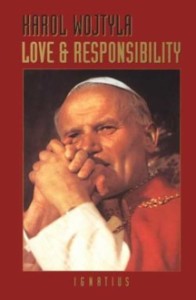 15. Love and Responsibility by Karol Wojtyla (Pope John Paul II) – 5 Stars
15. Love and Responsibility by Karol Wojtyla (Pope John Paul II) – 5 Stars
“Love in the full sense of the word is a virtue, not just an emotion, and still less a mere excitement of the senses. This virtue is produced in the will and has at its disposal the resources of the will’s spiritual potential: in other words, it is an authentic commitment of the free will of one person, resulting from the truth about another person.”
16. Unleashed by Erwin Raphael McManus – 4 Stars
“…’the Kingdom of God is near. Repent and believe the good news!’ (Mark 1:15) … So what is this good news? The refined and civilized version goes something like this: Jesus died and rose from the dead so that you can live a life of endless comfort, security, and indulgence. But really this is a bit too developed. Usually it’s more like this: if you’ll simply confess that you’re a sinner and believe in Jesus, you’ll be saved from the torment of eternal hellfire, then go to heaven when you die. Either case results in our domestication.
17. The Purity Myth by Jessica Valenti – 3 Stars
I don’t disagree with a lot of what Valenti calls out as wrong in much of this book. But I disagree with her associating it with “the virginity movement.” She writes, for instance, that “abstinence-only education seeks to create a world where everyone is straight, women are relegated to the home, the only appropriate family is a nuclear one, reproductive choices are negated, and the only sex people have is for procreation.” To which I say this: If that is true, abstinence-only education does not align with the Catholic Church’s teachings on sex.
18. Successful Strategies for Working (or Living) with Difficult Kids by Joyce E. Divinyi – 3 Stars
“Just as our emotional reactions to these children lead to judgments, our judgments have a significant impact on our expectations for these children. And children respond to our expectations. If we believe they are trouble, and will continue to be trouble, often they are. … The first step, therefore … is to suspend your judgments. … Start with the idea that this child has the potential for success at some level, and that with creativity, perseverance and the right structure, you just may be the one to help him or her succeed.”
19. Bible Basics for Catholics by John Bergsma – 4 Stars
“Our faith teaches us that, as children of God through Christ, all the rights and privileges of Adam have been restored to us. Like Adam, we can call God ‘Father’ (Luke 3:38). As royalty, we rule over our passions and possessions, rather than being ruled by them. As prophets, we speak God’s word to the people around us. As priests, we offer our very lives on a daily basis, as a ‘living sacrifice’ for the salvation of the whole world. Finally, as grooms and brides, we find our love and joy in embracing our true Spouse every time we come forward to receive communion.”
20. Men, Women and the Mystery of Love by Edward Sri – 4 Stars
“The reason John Paul II emphasizes this point is that he wants to show how the sexual urge ultimately is directed toward a human person. Therefore, the sexual urge is not bad in itself. In fact, since it is meant to orient us toward another person, the sexual urge can provide a framework for authentic love to develop.”
– – – –
What books did you read this year? Suggest some in the comments below. Always looking for new ones.



